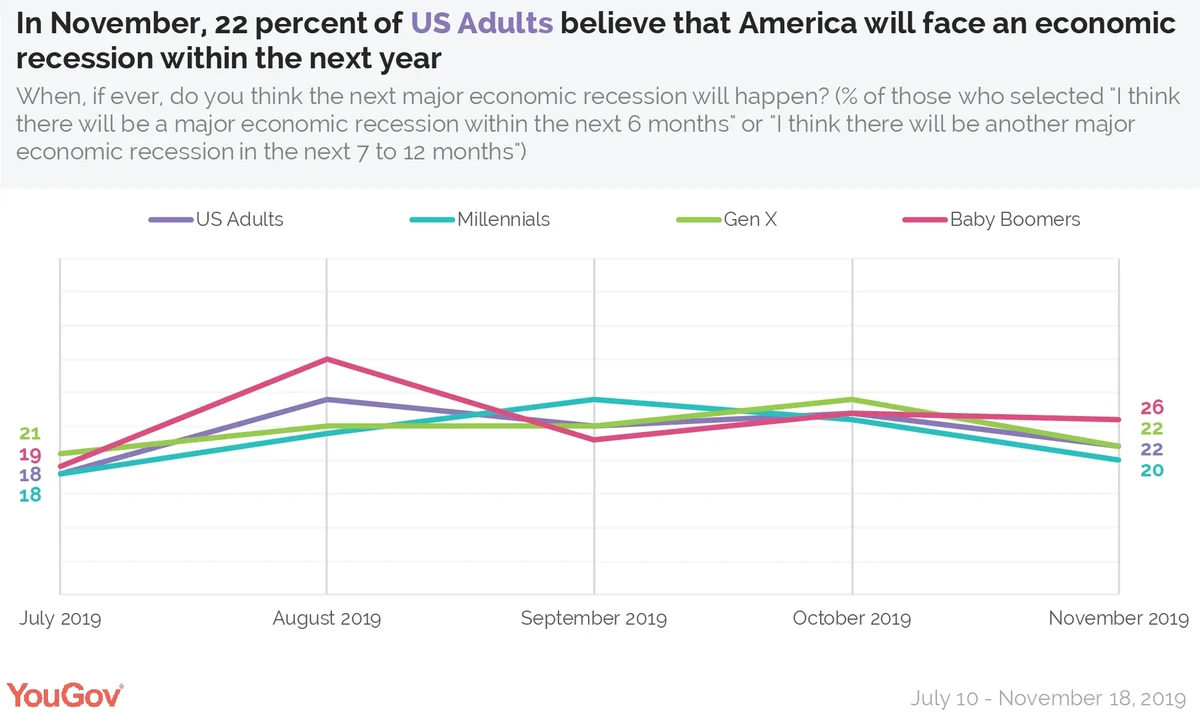Americans seem to be feeling a little less anxious this month about a pending recession.
Less than a quarter of Americans (22%) – and a quarter of registered voters (25%) – believe a major economic recession will arrive between the next year, according to a new YouGov survey of 1,242 US adults. That’s down from 25 percent and 32 percent, respectively, in October. YouGov asks its panelists each month to answer questions about when then anticipate the next recession could hit.
Baby Boomers (26%) are slightly more likely than Gen Xers (22%) and Millennials (20%) to think a recession is coming soon. Meanwhile, Democrats (34%) continue to be more wary of a coming economic downturn than Republicans (9%), though it’s worth noting that fears have diminished among both (from 47 and 13 percent, respectively, last month).

Be prepared
Not much has changed since last month in how Americans feel about their preparedness for recession: 42 percent say they are prepared (close to last month’s 40 percent).
- Men (48%) continue to display stronger confidence about preparedness than women (36%), though confidence among men remains down from August and September attitudes (52% and 53%, respectively). Confidence among women remains nearly the same as it has been throughout this research (coming in at 35% in all previous months).
- Gen Xers’ confidence in this has fallen somewhat, from 36 percent last month to 32 percent in November. Roughly a third of Millennials (32%) feel they’ve set themselves up to weather an economic storm (close to last month’s 33%), while over half of Baby Boomers (53%, up from 47% in October) indicate the same.
Pessimism continues to prevail when looking at the country’s preparedness as a whole, with roughly six in 10 Americans (59%, down slightly from 62% last month) believing the United States is “not very” or “not at all” prepared for a recession.
Democrats (70%) are significantly more likely than Republicans (52%) to fear the United States is unprepared, though it’s worth noting that majorities of both parties share this concern. It is also worth recognizing that this fear is on the rise among Republicans, with the aforementioned 52% percent marking a rise from 48 percent last month and 42 percent in September.
Executive influence
A 42 percent plurality of Americans (albeit a diminished one compared to 46% last month) believe President Donald Trump’s economic policies are making a recession more likely, while a growing 29 percent minority (up from 26%) feel his policies are making a recession less likely. Among registered voters, 45 percent believe the president’s policies are making a recession more likely (down from 49%) while 36 percent say less likely (up from 29%). Partisan splits continue to follow predictable trends:
- More than seven in 10 Democrats (72%, down from 75% in October and 78% in September) say the president’s policies are making a recession more likely, while nearly seven in 10 Republicans (69%, up considerably from 54% last month and 52% in October) believe his policies are making it less likely.
- While Independents fall between the two parties, a four in 10 plurality (40%) say Trump’s economic policies are making a recession more likely while just under three in 10 (28%) indicate that his policies are making one less likely.
Holiday spending
Nearly four in 10 Americans (38%) indicate that their outlook on the US economy will have a great deal (13%) or some (25%) influence on their planned spending on gifts this holiday season. Perhaps forebodingly for the little ones, those with kids under 18 (48%) are considerably more likely than those without children (35%) to indicate this.
Travel and entertainment plans could also be impacted, albeit a bit less so:
- Thirty-two percent of Americans estimate that their outlook on the economy will impact travel spending a great deal or somewhat during the holiday season.
- Similarly, 31 percent say their feelings on the economy will influence their spending on entertaining this holiday season
In both cases, parents with kids under 18 (41% and 40%, respectively) are more likely than those without children (31% and 30%) to say their feelings on the economy will influence these categories of spending over the holiday season.
Look at the economic trend data from November, October, and September.
Image: Getty








